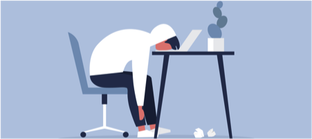 Fatigue - An overview What is Fatigue? Fatigue is an overwhelming sense of physical or mental tiredness that may affect any or all areas of functioning: physical, cognitive, and social. For people who have had a brain injury, fatigue is a very common and persistent problem. ‘Mental’ versus ‘physical’ fatigue Physical fatigue refers to the fatigue that results from any kind of physical labour such as exercising, mowing the lawn, and playing outside with the children. Just after a brain injury, physical fatigue may be a problem. For example, it requires a lot of energy to relearn how to walk. For most people, physical fatigue tends to subside after about six months following the injury. Mental fatigue refers to the fatigue that results from ‘brain work’, such as working on the computer, writing a letter, reading the newspaper, conversing, studying, planning and problem solving, and driving. Although mental fatigue also decreases over time, it tends to be a very persistent problem that needs to be managed carefully. For most people it does not go away completely. Why is mental fatigue a common symptom of brain injury? It is not known exactly why fatigue is such a common problem for people who have had a brain injury. However, it is thought that fatigue results because the brain has to work a lot harder than it did prior to the injury. Some of the brain cells are damaged, and do not work as efficiently as they should – information does not flow as easily around the brain. The brain has to work harder to cope with this, resulting in fatigue. Also, the brain takes longer to restore its energy, meaning that it takes longer to recover from fatigue than it did prior to the injury. Fatigue may also be a side effect of some medication. Mental fatigue can affect the success of all rehabilitation efforts. Fatigue decreases concentration, memory, and social interactions. It increases irritability, distractibility, depression, and anxiety. Fatigue can cause confusion and decrease the ability to make good decisions. It may also increase physical symptoms such as headaches and dizziness. It is therefore very important to manage fatigue. What can be done about it? It is a good idea to slowly build up active hours, gradually increasing stamina. The number of home and social activities undertaken may also need to be reduced. There are a number of basic strategies that can be used to manage fatigue: 
‘Rest’ can be simply lying down, or sitting quietly. It does not have to be a ‘sleep’.
Conclusion Fatigue is a common and persistent problem following a brain injury, which may require some lifestyle changes. However, effective fatigue management can be achieved. Much of this revolves around weekly scheduling of activities, rest periods, and appointments. If you need help relaxing, with physical exercise or diet, our friendly therapists can help, just contact Therapy Professionals Ltd Comments are closed.
|
AuthorShonagh O'Hagan Archives
July 2024
|

 RSS Feed
RSS Feed